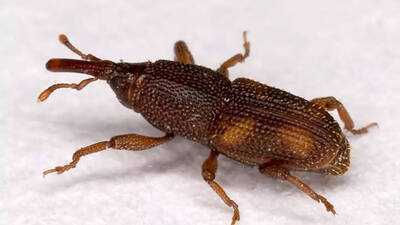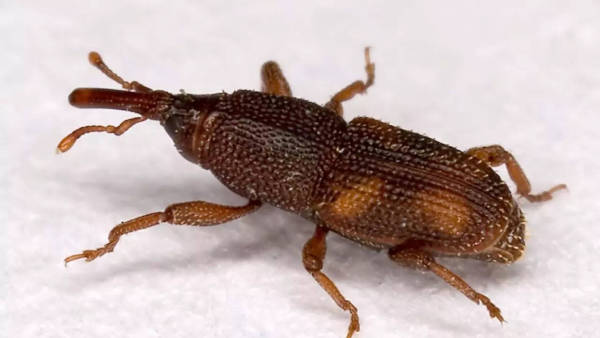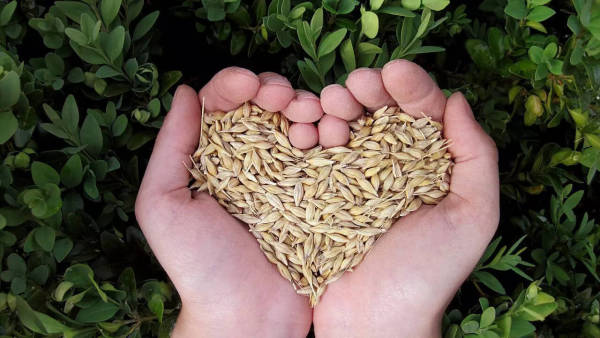How to identify “keede” in rice or grains: Prevention and hacks to remove them you must try

“Chawal keede”, or rice weevils, are tiny, dark brown to reddish-black insects that infest stored grains like rice, atta, and dal. They are a common headache plaguing the Indian kitchen and can cause digestive problems if eaten. They live and breed inside the grains, feeding on them from within.
You may notice tiny white larvae floating to the top when washing rice or small holes in the grains. If you see small holes in the rice grains, that’s them eating from inside. Mostly, these worms grow in damp and humid conditions, during the monsoon season. It is the best breeding ground for them. Once they start reproducing, it is impossible to get rid of them.
How to identify “keede” in rice or grains

Regularly inspect rice and grain products for small, black or brown beetles, about half the size of a long grain of rice. Look for signs of infestation, such as sticky webs or silky strands with small clumps of broken rice, often crawling inside packets of rice. These webs are spun by rice weevil larvae and can be noticeable before the bugs themselves are spotted.
How to keep weevils out of grains
 1. Store in airtight containers
1. Store in airtight containers: Store rice and grains in glass or plastic sealed containers to prevent weevils from getting in. Weevils can chew through paper, cardboard, and thin plastic packaging.
2. Use natural repellents: Use strong aromas like bay leaves, cloves, garlic, and crushed peppercorns to repel weevils. These spices have natural properties that repel weevils and prevent infestation.
3. Check food before storing: Inspect dried food products before storing them in your kitchen. Check for silky webs and signs of weevil contamination.
4. Store in a cool, dry place: Store rice and grains in a cool, dry place or refrigerator. Weevils become inactive in temperatures lower than 55°F (13°C), preventing reproduction and infestation.
5. Buy in small quantities: Buy rice and grains in small quantities to prevent weevil infestations. Purchasing smaller quantities reduces the chance of weevils pupating and turning into adult beetles.
6. Check for silky webs: Check food packaging for silky webs, which can indicate weevil infestation. If you find webs, it's best to discard the food.
7. Maintain clean storage: Maintain clean storage areas and regularly check for signs of weevil infestation. Proper storage and regular checks can help prevent weevil infestations and keep your pantry pest-free.
Easy home hacks to remove weevils from stored grains at homeEffective eradication methods can help eliminate these pests from your kitchen, ensuring your stored grains remain safe and healthy for consumption.
1. Dry rice in sunlight: Expose infested grains to direct sunlight to get rid of weevils. evenly spread rice on a tray or newspaper and expose it to the hot sun for several hours. This will kill weevils and their eggs.
2. Use a wet cloth trap: Cover the rice container with a wet cloth to trap weevils. Weevils are attracted to humidity and will stick to the cloth. After 30 minutes, discard the cloth and clean the rice.
3. Store in freezer: Store rice in the freezer for 3 days to kill weevils and their eggs. Cold temperatures stop the weevil's growth and prevent infestation.
4. Airtight containers: Store rice in airtight containers to prevent weevil infestation. Clean and dry containers tightly closed will cause weevils to die due to a lack of air.
5. Bay leaves and Neem leaves: Place dried bay or neem leaves in a rice container to repel weevils. They have natural properties and a strong aroma that prevents infestation
6. Spice repellent: Use spices like ginger, cloves, and garlic to repel weevils. Place them in a rice container and replace them periodically. These spices have strong aromas that weevils dislike.
7. Dried orange peel: Chop the dried orange peel into small pieces, and then sprinkle it into the rice container, wherever there are worms.
8. Matchbox trick: Place an open matchbox near grains to repel worms. Matchboxes contain sulphur, which worms dislike, keeping them away from grains
 “Chawal keede”, or rice weevils, are tiny, dark brown to reddish-black insects that infest stored grains like rice, atta, and dal. They are a common headache plaguing the Indian kitchen and can cause digestive problems if eaten. They live and breed inside the grains, feeding on them from within.
“Chawal keede”, or rice weevils, are tiny, dark brown to reddish-black insects that infest stored grains like rice, atta, and dal. They are a common headache plaguing the Indian kitchen and can cause digestive problems if eaten. They live and breed inside the grains, feeding on them from within.

